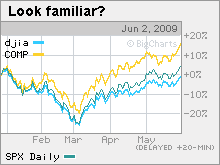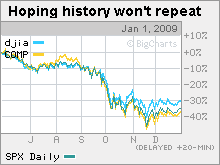It's deja vu for stocks
The market's performance this year looks a lot like the first five months of 2008. But there are growing hopes the last seven months won't be as bad as last year.



NEW YORK (CNNMoney.com) -- After a bleak beginning to 2009, stocks are rallying and many investors are hopeful that the worst has passed.
Funny thing is, that's where we were this time last year, just before the markets and the economy went into a tailspin.
Consider the parallels. Gold briefly traded above $1000 an ounce, a sure sign of investor fear, at the beginning of last year and this year.
In March 2008, Bear Stearns was "saved" when it was sold to JPMorgan Chase (JPM, Fortune 500) in a government-approved fire sale. In late February of this year, Citigroup (C, Fortune 500) was pulled from the brink by yet another bailout from the Federal Reserve.
Government stimulus packages have also played a role in both years. Last year, it was President Bush's tax rebates that led some to think the economy might have hit bottom. This year, President Obama's plan to create more jobs is raising similar hopes.
In fact, it's uncanny how the performance of the major market barometers in the first five months of 2008 mirror this year's January through May period (see charts to the right).
Sure, the dip earlier this year was more severe, and the subsequent rally has been more explosive. But the charts essentially show the same pattern.
And as we all know, that movie didn't end too well last year. In case you forgot, the third chart to the right is a painful reminder.
Stocks took a turn for the worse heading into last July as it started to become evident that the bottom had yet to truly fall out of the financial sector. The market really nosedived in September following the implosion of Lehman Brothers.
Is this time going to be different? It's tempting to say that it is. But some investors are understandably still wary, having been burned a year ago.
"The next few weeks will be critical. There is some skepticism with respect to the economy," said Todd Salamone, senior vice president with Schaeffer's Investment Research in Cincinnati. "There is still uncertainty about whether the credit crisis has completely played out and concerns about the unintended consequences of stimulus, such as inflation."
Talkback: Do you feel better about the economy and markets than this time a year ago? Leave your comments at the bottom of this story.
But others think that these fears are already priced into the markets. Even with bank stocks rallying sharply, investors seem to be aware of, if not necessarily worried about, potential problems with commercial real estate loans, for example.
What's more, inflation would be a consequence of an improving economy. It's, of course, something that needs to be closely monitored. Still, it seems like it's a risk investors are willing to live with for the time being.
Don't get me wrong. Few are forecasting rosy times ahead for the economy. In fact, the American Bankruptcy Institute reported Tuesday that U.S. consumer bankruptcies in May were up 37% from a year ago.
Then again, the level of bankruptcies was down slightly from April of this year. That could be further proof that the economy no longer seems to be staring into the abyss. And that's what seems to be sparking this rally.
"This is not going to be an easy couple of years for people. There's no truly great news out there but the economy isn't in free fall. It's stabilizing," said Eric Ross, director of U.S. research for Canaccord Adams, an investment bank. "Because of that people and businesses can start to make more intelligent decisions about what to do with their money."
It is remarkable how investors have shrugged off developments that, if they happened last summer, might have been viewed as further signs of economic disaster.
Honestly, would anyone have predicted a year ago that markets would surge on a day when General Motors (GMGMQ) (that GMGMQ ticker is going to take some time getting used to) filed for bankruptcy?
Investors have not only become inured to more bad news. They also appear to be genuinely more upbeat than they were now at this time a year ago. And that's important.
Salamone points out that the sheer level of fear-induced selling earlier this year was much greater than it was before Bear almost went under in March 2008. That's evident from the fact that the VIX (VIX), a key index that measures volatility on Wall Street, was much higher in March this year than it was a year ago.
"One can look at sentiment and potentially, you could conclude that 2009 will turn out better than 2008," Salamone said. "This past March, the market was at one of the most oversold levels in decades. That's not a condition we had last year."
In other words, the sense of impending doom is largely gone. And unless it returns, Ross thinks the markets will, at the very least, chug along. Even if they don't continue to surge, he doubts they'll plummet like they did last summer and fall.
"I don't think we will have the same collapse in confidence like we had last year. That was all about liquidity problems followed by panic," he said. "Now, people think the worst case is the economy is in a slow grind. A slow grind doesn't get you into a panic."
Talkback: Do you feel better about the economy and markets than this time a year ago? ![]()

